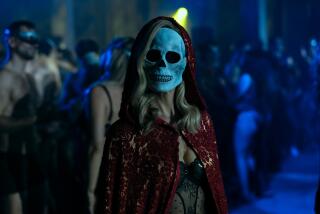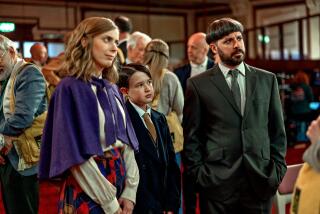TWO RISKY SHOWS LIGHT UP GRAY TV
- Share via
Risky business.
No one will ever accuse the entertainment industry of living on the edge. Mention taking a chance and knees start knocking, teeth start chattering and every high-paid executive’s Mercedes starts Benzing. No wonder that nearly all TV is soft-centered, pudding-hearted, thumb-sucking, slumbering and curled into a fetal position. Prime time is a pudgy, fleshy eunuch, locked in a middle channel.
Which makes recent risk-taking episodes of NBC’s “St. Elsewhere” and ABC’s “Moonlighting” all the more amazing and admirable.
“St. Elsewhere” has had many superior episodes in four-plus seasons, but none bolder than one in which Dr. Wayne Fiscus (Howie Mandel) lingered in a deathly state between heaven and hell after being shot in the chest by the estranged wife of a patient. It was “St. Elsewhere” at its best and most unusual.
Now in its second full season, “Moonlighting” plays Russian roulette almost every week.
Creator and executive producer Glenn Caron has turned “Moonlighting” into the razziest, snazziest hit on TV by breaking rules. His series takes longer to write and shoot than most other hour programs. It’s also more expensive (worth every penny, artistically) and more outrageous.
Occasionally it’s a detective story, more often a people story defined by a near-lethal, almost-but-not-quite-yet romance between silky Maddie Hayes (Cybill Shepherd) and do-whopping David Addison (Bruce Willis).
Caron’s stories usually don’t climax, they just sort of . . . stop, in mid-mood, often making you feel that you now understand David and Maddie just a little bit less than you did before. It’s excruciatingly, exquisitely baffling.
“Everything is filled with enigma,” Caron said. “I think enigma is kind of wonderful.”
Most times, “Moonlighting” is just kind of wonderful. A recent hour--which revealed that the mysterious David had an ex-wife who left him for another woman--was extraordinary, let’s-preserve-it-in-a-time-capsule TV.
You got shadings and half-tones and gleaming dialogue and a dream by Maddie that became a seven-minute dance sequence set to new Billy Joel music and inspired by an expressionistic number that Gene Kelly danced with Cyd Charisse in “Singin’ in the Rain.”
Written by Karen Hall and directed by Chris Nyby, this was Caron’s favorite episode “because it was about something so tiny and because our lives are made up of so many tiny things.”
A week later, “Moonlighting” pressed a different button, withdrawing to ye olde Middle Ages in a parody of Shakespeare’s “Taming of the Shrew.” Written by Jeff Reno and Ron Osborn and directed by Will MacKenzie, it was untamed TV and flawed, but you had to admire its vision and chutzpah.
Caron resists the daring label.
“When we’re taking risks, I don’t know we’re taking risks,” he said. “We don’t sit around each week and say, ‘Let’s do this, let’s do that.’ This is going to sound pretentious, but it’s purer than that. We chase a central truth. Our characters tell us where to take them. I’ll gladly take the credit, but it’s not risk-taking. It’s storytelling.”
For someone who was hitless before “Moonlighting,” Caron got enormous freedom from ABC even in his show’s first season. That was when Caron decolorized “Moonlighting” to create its most famous episode, a black-and-white spoof of the kinds of 1940s movies that Ted Turner is now colorizing.
And “The Taming of the Shrew”?
“Last year I said I wanted to do an episode in iambic pentameter,” Caron said, “and everyone just looked at me and said I would get over it.” He didn’t. Hence Shakespeare via costumed “Moonlighting,” with typical comedic homage to cinema.
At one point, Petruchio (Willis) advanced on Kate (Shepherd) with a line inspired by Jack Nicholson’s mad killer terrifying his wife in “The Shining.” Only Nicholson’s grinning, chilling, “Herrrrre’s Johnny” became Willis’ “Herrrre’s Petruchio.”
Caron also loved last season’s episode--repeated a couple of weeks ago--in which Maddie discovered her father was going out on her mother.
“Moonlighting” is ever in danger of straying from its roots by centering on one character, as it did with Maddie in Tuesday night’s episode inspired by “It’s a Wonderful Life.” And it always risks getting too cute.
When “Moonlighting” is on its game, “It’s like being at a party with someone who is very witty,” Caron said. “When we go too far, it’s like being at a party with someone who’s had too much to drink.”
Meanwhile, he would like to buy rights to the 1925 silent film “The Lost World” and “mat” David and Maddie into its story about prehistoric beasts on a deserted island. “I’d also like to do a Godzilla film--Godzilla vs. King Kong, and have them save Tokyo.”
Exceptional TV is often costly TV, hence “Moonlighting” shares an “expensive” tag along with such shows as “Miami Vice,” “L.A. Law” and “St. Elsewhere.” But Caron doesn’t like tags.
“TV is a ridiculous industry,” he said, “where everyone works under the presumption that a particular hour of broadcast material should cost the same as any other hour. They say that an hour of TV should cost $900,000 (“Moonlighting” is said to often cost almost double that), as if you buy it by the yard. That’s stupid TV.”
The “St. Elsewhere” episode looked very swanky.
It featured intermittent dreamlike sequences, cutting back and forth between a lifeless Fiscus on the operating table, being worked over by his colleagues, to a terrified and bewildered Fiscus drifting between heaven and hell.
The story began with Fiscus chasing fireflies in front of the hospital at night and finally capturing one in a glass jar. Directed by supervising producer Mark Tinker and written by Tinker and producers Tom Fontana and John Masius, it was highly unusual, almost surreal TV in which Fiscus’ colleagues were personally renewed by restoring him to life.
Before that happened, though, Fiscus twice passed through hell, encountering two of his dead patients in addition to a murdered doctor/rapist/drug addict and some stripe-shirted, whistle-blowing football referees. “They never played the game,” Fiscus observed. “They just pass judgment on real athletes.”
He also found himself in heaven: a genteel lawn party attended by a deceased heart-transplant patient and God, an ordinary guy who looks and sounds like Fiscus. “I just create circumstances,” said God, denying omnipotence. “I turn my head, things have changed. . . .”
“St. Elsewhere” and “Moonlighting,” flickering brightness in TV’s night.
Fireflies.
More to Read
The complete guide to home viewing
Get Screen Gab for everything about the TV shows and streaming movies everyone’s talking about.
You may occasionally receive promotional content from the Los Angeles Times.






